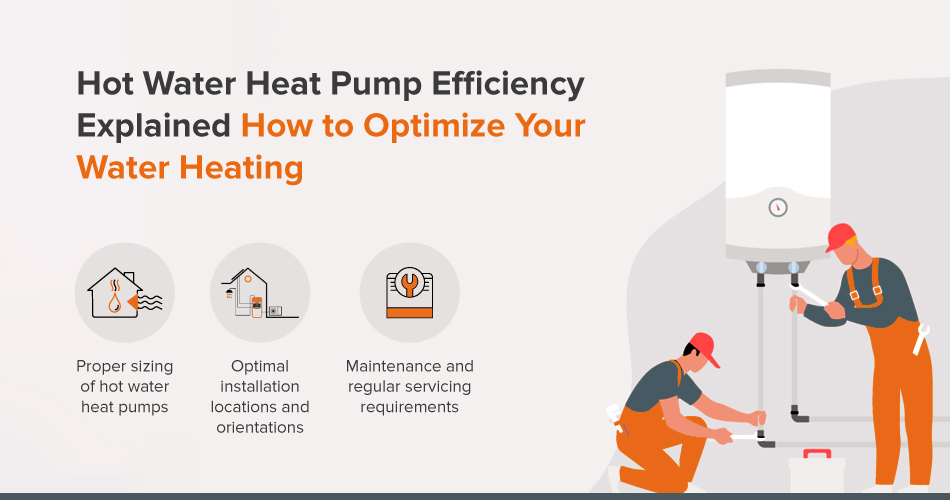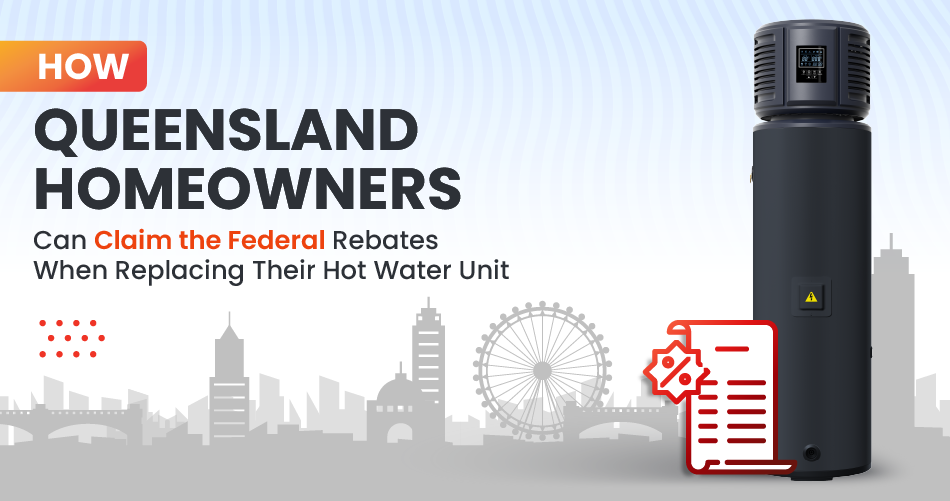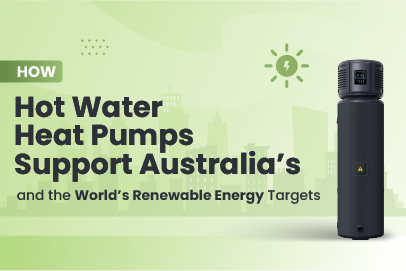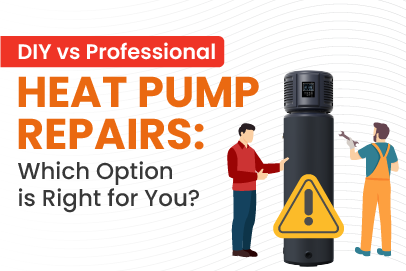Hot water heating efficiency is critical for both environmental and economic reasons. It influences how much energy is consumed to heat the water in your home, directly affecting your utility bills.
A highly efficient system requires less energy, which not only reduces costs but also minimizes the emission of greenhouse gases. It's, therefore, crucial to aim for the highest possible efficiency when selecting a hot water heating system.
Enter hot water heat pumps - a groundbreaking solution in the realm of water heating. These devices work on a simple yet efficient principle: instead of generating heat, they transfer it.
They capture heat from the air or ground around them and use this to warm your water. Essentially, they're recycling heat that's readily available, which makes them far more energy-efficient than traditional water heating methods.
This blog post aims to guide you on your journey towards achieving optimal hot water heat pump efficiency. We're going to delve into the technology behind these innovative devices, the factors that can influence their efficiency, and practical tips for optimizing their performance. Furthermore, we'll touch on the financial incentives and regulations relating to hot water heat pumps in Australia.
So, whether you're contemplating installing a hot water heat pump or seeking ways to make your current system work better, this blog is for you.
Understanding Hot Water Heat Pumps
Hot water heat pumps are a marvel of modern heating technology. They operate based on the principle of heat transference - simply put, they move heat from one location (the air or ground) to another (your water).
• Advantages of using heat pumps for water heating
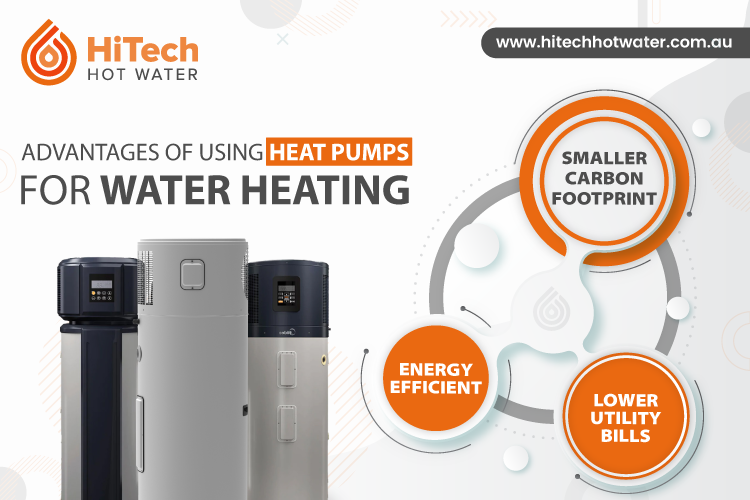
The benefits of using hot water heat pumps are manifold. First and foremost, they are significantly more energy-efficient than traditional heating methods, meaning lower utility bills for you.
• Comparison with traditional water heating methods
Traditional water heating methods like gas or electric heaters directly generate heat, often leading to considerable energy loss and higher operational costs. On the other hand, heat pumps transfer existing heat from the surroundings, using less energy and thus operating more efficiently.
• Overview of the Australian market for hot water heat pumps
Australia's climate and increasing emphasis on sustainable living make it a prime market for hot water heat pumps. According to industry reports, the demand for these devices is steadily growing.
Factors Affecting Hot Water Heat Pump Efficiency
Australia's diverse climate plays a significant role in the efficiency of hot water heat pumps. These devices work best in warmer climates, where they can efficiently extract heat from the air.
• Proper sizing of hot water heat pumps
The size of your hot water heat pump also significantly affects its efficiency. A unit that's too small won't heat your water adequately, while an oversized unit will lead to unnecessary energy consumption.
• Optimal installation locations and orientations
Where and how your heat pump is installed can also impact its efficiency. Heat pumps should ideally be installed in a well-ventilated area with plenty of access to ambient heat.
• Maintenance and regular servicing requirements
Regular maintenance is critical to maintain the efficiency of your hot water heat pump. This includes cleaning filters, ensuring that refrigerant levels are correct, and checking for any signs of wear and tear.
Tips to Optimize Hot Water Heat Pump Efficiency
The temperature set on your heat pump can significantly influence its efficiency. A higher setting will cause the pump to work harder, consuming more energy. Conversely, a setting that's too low may not provide enough hot water.
Timers and smart controls can optimize the operation of your hot water heat pump. You can program your pump to operate during the warmest part of the day when it can absorb heat most efficiently or during off-peak times when electricity rates are lower.
Adequate ventilation and airflow around your heat pump are essential for its efficient operation. The pump needs access to plenty of ambient air from which it can extract heat.
Financial Incentives and Regulations in Australia
The Australian government is committed to promoting energy-efficient appliances, including hot water heat pumps. As such, several rebates and incentives are available for homeowners who choose these devices.
There are several regulations and standards in Australia governing the installation and use of hot water heat pumps. These include minimum energy performance standards, safety regulations, and installation codes.

Conclusion
In this blog, we've covered the importance of hot water heat pump efficiency and how these innovative devices work. We've also highlighted the many advantages of using heat pumps for water heating compared to traditional methods, and we have provided an overview of the Australian market for these devices.
At HiTech Hot Water, we're here to assist you on this journey. Our team of experts can provide advice tailored to your needs, ensuring you choose the right hot water heat pump and achieve optimal efficiency.
Get in touch with us today, and let's work together to create a greener, more energy-efficient home! Call 1300 011 015 or email us [email protected]
FAQs
Yes, heat pumps can indeed be up to 300% efficient, or even more. This is because they don't generate heat but move existing heat from one place to another. This process requires less energy than traditional heating methods, allowing heat pumps to deliver three times as much heat as the electricity they consume. This gives them an efficiency rating of 300%.
A heat pump can be 200% efficient because, like the case of 300% efficiency, it transfers heat instead of generating it. A heat pump that is 200% efficient can produce twice the amount of heat energy as the electrical energy it consumes. This efficiency is possible due to the technology behind heat pumps and the fact they utilize heat from the environment, which is free.
Absolutely! Technology has improved significantly over the past two decades. Modern heat pumps are more efficient, reliable, and durable than their predecessors. They are designed to perform optimally in a wider range of climates, and many are equipped with advanced features like programmable thermostats, smart controls, and energy-saving modes.
Efficiency over 100% may seem impossible, but it makes sense when you understand how heat pumps work. Traditional heaters have efficiencies below 100% because they convert energy (like gas or electricity) into heat, and some energy is inevitably lost in the process. However, heat pumps simply move heat from one place to another, which requires less energy. Therefore, they can deliver more heat energy than the electrical energy they consume, resulting in an efficiency greater than 100%.
Heat pump efficiency is typically measured by its Coefficient of Performance (COP), which is the ratio of the heat output to the electrical energy input. The higher the COP, the more efficient the heat pump. For example, a COP of 3 means the heat pump produces three times as much heat as the electricity it uses. However, the actual efficiency can vary depending on factors like the outside temperature and the temperature setting of the heat pump.

